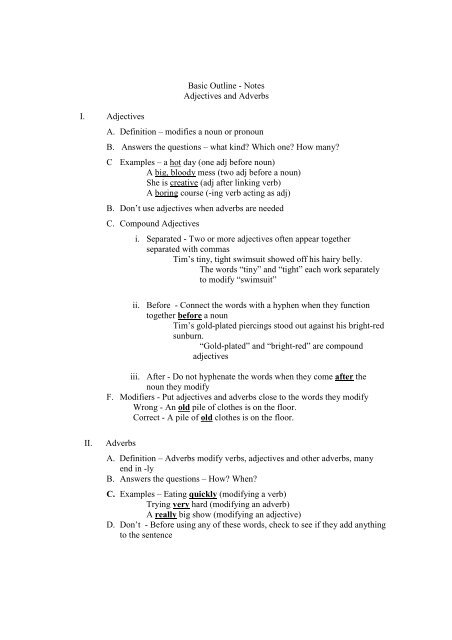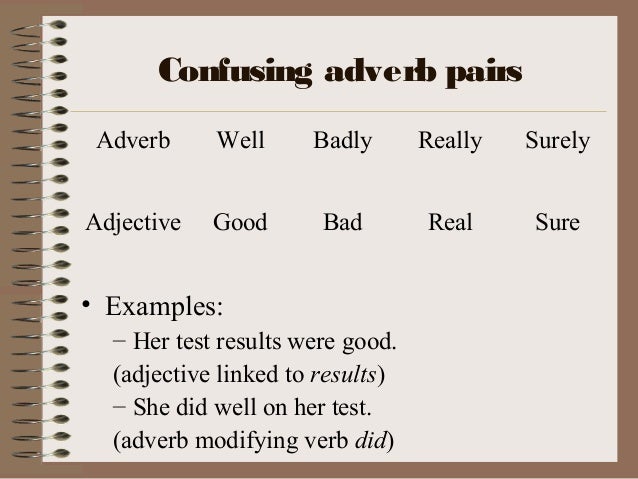

Many students confuse these six adverbs, so here is an explanation of how to use them.
Very means a lot. It is used before adjectivesandadverbs to make them stronger. It is the opposite of a little.
Really is an adverb, and it modifies other adverbs, verbs, or adjectives. It has a meaning of 'very.' Incorrect: Students did real well on the midterm. Correct: Students did really well on the midterm. Real is an adjective, and can be used to modify nouns. This is explained above. 'tiny' is an extreme adjective and we don't generally use 'very' with extreme adjectives, though we do sometimes use 'really' or 'absolutely' to modify them. It's true that 'very' and 'really' effectively have the same meaning, and so I can appreciate that this is a little confusing. (rare) Characterised or marked by realness or reality; actual. Synonyms: true to life. Examples: “The current trend is to cut the subsidies and make the economies more, competitive and allow the market forces to bring about a realsome price level for all sections of the people.”.
Examples:
I know he’s going to be verytired after his long trip. (He’s going to be much more than a little tired.)
We are both veryinterested in science. (We’re much more than a little interested.)
She learns veryquickly. (She learns more quickly than normal.)
In the negativevery doesn’t mean a lot. It means nothing, but people like to use it anyway.
Examples:
She doesn’t know him verywell. (She doesn’t know him well.)
They don’t have verymuch money. (They don’t have much money.)
I’mnot a verygood singer. (I’m not a good singer.)
Also, you can say very very, which makes it even stronger.

Examples:
She knows me very verywell.
I’m very veryproud of you.
Really has the same meaning as very, but really can be used before an adjective, an adverb and a verb.
Examples:
She was reallytired, so she went to bed.
He walked home reallyslowly.
I reallylike this city.
NOTE: You cannot say: I verylike this city. Very cannot be used before a verb but only before an adjective or an adverb.
Also, you can say really really, which makes it even stronger.
Examples:
She is a really really good athlete.
I was really really sad to hear the bad news.

Quite is also strong and means the same thing as very and really. Like really, it is used before adjectives, adverbs and verbs.
Examples:
I’ve been quitetired these past couple days.
She sings quitebeautifully.
We quitelike that painting, so we’re going to hang it in the living room.
Pretty is a little less strong than very. It is used before adjectivesandadverbs but not before verbs.
Examples:
This soup tastes prettybad. (which is not as bad as verybad)
I think she sings prettywell. (which is not as well as verywell)
I’m prettytired after a long day of skiing. (which is not as tired as verytired)
So is stronger than very. Use it when very isn’t strong enough. It is used before adjectives, adverbs but not before verbs.
Really Nice Adjectives
Examples:
I’m sotired of hearing the neighbors argue. (more than verytired)
She talks sofast that sometimes I don’t understand what she says. (more than veryfast)
We’re soglad you decided to come work for us. (more than veryglad)

Also, use so(adjective/adverb)that when a reason or a result is stated. You can drop that if you want to.
Examples:
They were sogratefulthat we had helped them. (Our helping them was the reason they were grateful.)
She sang sobeautifully people in the audience started to cry. (People starting to cry was the result of her singing.)
You were soexcitedthat you had won the contest. (Your winning the contest was the reason you were excited.)
Too is the strongest, and is used when something cannot be done. Reference track hip hop. The thing that cannot be done starts with to. You don’t have to state what cannot be done, however, if it was stated earlier. It is used before adjectives, adverbs but not before verbs.
Examples:
They were tootiredto play another game. (Playing another game could not be done.)
They were walking tooslowlyto get to school on time. (Getting to school on time could not be done.)
It’s toolateto do anything about it. (Nothing can be done.)
Really Strong Adjectives
BUT NOT: The team was too excited about their win. (Nothing cannot be done.)
CORRECT: The team was very/really/soexcited about their win.
Good Adjectives To Describe Yourself
So let’s review:
Very goes before an adjective or an adverb but NOT a verb. It is strong.
The version of TmpDisk for Mac you are about to download is 1.2.2. The download was scanned for viruses by our system. We also recommend you check the files before installation. TmpDisk antivirus report. This download is virus-free. This file was last analysed by Free Download Manager Lib 6 days ago. Tmpdisk. Ram Disk Management App for OSX. Contribute to joeledstrom/tmpdisk development by creating an account on GitHub. TmpDisk is an Open Source simple RamDisk management tool. RamDisks are disks that use your memory (RAM) to create virtual hard disks on your Mac. RamDisks can be any size, limited only by your total memory and lightning fast. They are also temporary.
Really can go before an adjective, an adverb or a verb. It is just as strong as very.
Quite can go before an adjective, an adverb or a verb. It is just as strong as very.
Pretty can go only before an adjective or an adverb. Use it to make the word a little stronger. It is the weakest of the six words.
So is used when very isn’t strong enough. It is used before an adjective or an adverb. It’s also used when a reason or result follows.
Too is used when something cannot be done. That thing starts with to. It is used before an adjective or an adverb.
Study this page and when you’re ready, do the exercise below.
© 2013 Ambien Malecot
